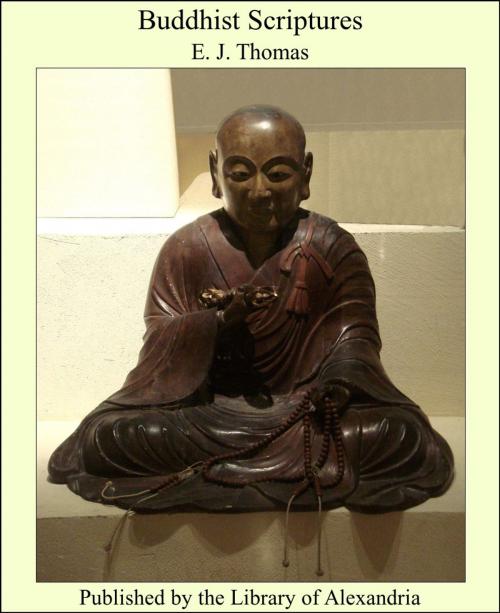| Author: | E. J. Thomas | ISBN: | 9781465535467 |
| Publisher: | Library of Alexandria | Publication: | March 8, 2015 |
| Imprint: | Language: | English |
| Author: | E. J. Thomas |
| ISBN: | 9781465535467 |
| Publisher: | Library of Alexandria |
| Publication: | March 8, 2015 |
| Imprint: | |
| Language: | English |
To what extent can we speak of Buddhism as a religion—a system which rejects a belief in an immortal soul and an eternal God? We shall do well not to seek to answer this by fitting our reply into the limits of a ready-made definition. Buddhism implies a certain attitude to the universe, a conception which gives meaning to life, but it does not look upon the ultimate reality of things as personal. It succeeds indeed, more than any Other system, in evading ultimate questions, though even in rejecting metaphysics it was unable to remain wholly unmetaphysical. The chief ontological principle of Buddhism is that all compound things are impermanent; and it went on to assert that all things are compound except space and Nirvana. The self is compound, and hence impermanent. When the individual is analysed into body and mind with its qualities and functions, what is there remaining behind? The soul, atman, said the Vedantin, that permanent entity which is in reality identical with the absolute and eternal Brahma. But the Buddhist answer was that there is nothing remaining. The elements of the self are the self, just as the parts of the chariot are the chariot. Whether this is philosophically or even psychologically sound is another question. This analysis was applied to all things and beings, and hence also to the gods. The gods were not denied, but their permanence was, and hence there was no paramatman or universal soul, of which the gods, according to the orthodox philosophy, were the manifestations. In this sense Buddhism is atheistic. The gods were merely beings, involved like us in incessant change, who by merit had acquired their high rank of existence, and who would lose it when their merit was exhausted. They were, as the Sankhya philosophy said, office-holders, and any one by sufficient merit could attain to that rank. Buddha himself, according to the legends of his previous births, several times became Sakka (Indra) and even Brahma. In the birth-story of the hare (Jataka, No. 316), when the hare resolves to sacrifice himself to provide food for the brahmin, the throne of Sakka, king of the gods, becomes hot, and Sakka becomes uneasy on finding that there is a being with so much merit who is likely to displace him.
To what extent can we speak of Buddhism as a religion—a system which rejects a belief in an immortal soul and an eternal God? We shall do well not to seek to answer this by fitting our reply into the limits of a ready-made definition. Buddhism implies a certain attitude to the universe, a conception which gives meaning to life, but it does not look upon the ultimate reality of things as personal. It succeeds indeed, more than any Other system, in evading ultimate questions, though even in rejecting metaphysics it was unable to remain wholly unmetaphysical. The chief ontological principle of Buddhism is that all compound things are impermanent; and it went on to assert that all things are compound except space and Nirvana. The self is compound, and hence impermanent. When the individual is analysed into body and mind with its qualities and functions, what is there remaining behind? The soul, atman, said the Vedantin, that permanent entity which is in reality identical with the absolute and eternal Brahma. But the Buddhist answer was that there is nothing remaining. The elements of the self are the self, just as the parts of the chariot are the chariot. Whether this is philosophically or even psychologically sound is another question. This analysis was applied to all things and beings, and hence also to the gods. The gods were not denied, but their permanence was, and hence there was no paramatman or universal soul, of which the gods, according to the orthodox philosophy, were the manifestations. In this sense Buddhism is atheistic. The gods were merely beings, involved like us in incessant change, who by merit had acquired their high rank of existence, and who would lose it when their merit was exhausted. They were, as the Sankhya philosophy said, office-holders, and any one by sufficient merit could attain to that rank. Buddha himself, according to the legends of his previous births, several times became Sakka (Indra) and even Brahma. In the birth-story of the hare (Jataka, No. 316), when the hare resolves to sacrifice himself to provide food for the brahmin, the throne of Sakka, king of the gods, becomes hot, and Sakka becomes uneasy on finding that there is a being with so much merit who is likely to displace him.















